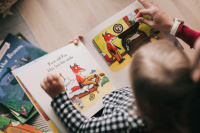Educational Psychology
Ormrod
Educational Psychology: Developing Learners, Fifth Edition, is known for its exceptionally clear and engaging writing, its in-depth focus on learning, and its extensive concrete applications. Its unique approach helps students understand concepts by encouraging them to examine their own learning and then showing them how to apply these concepts as teachers. The book concentrates on core concepts and principles and gives students an in-depth understanding of the central ideas of educational psychology. The text, more then any other text, moves seamlessly between theory and applications, and includes innumerable concrete examples-video cases, written cases, student artifacts, and more-to help students connect educational psychology to children and classrooms. Its six chapters on learning, wealth of practical applications, and innovative learning package make this the best text for maximum student comprehension. A focus on helping students truly see and better understand children and adolescents.NEW! Video Examples to Accompany Educational Psychology: Developing Learners-a two-volume CD set bound in every copy of the book. The textbook continually refers to specific clips as illustrations of concepts and principles under discussion. Volume 1: Observing Children and Adolescents-includes 19 videos of children and adolescents engaging in learning/problem-solving tasks and discussing learning strategies, interpersonal relationships, emotions, motivation, etc. Volume 2: Observing Classrooms in Action-includes 11 videos of lessons and activities in elementary school, middle school, and high school classrooms-illustrate a variety of teaching strategies and classroom management styles. NEW! Developmental Trends tables-one or more of these tables appears in every chapter except Chapter One-gives increased emphasis to child and adolescent development in the fifth edition. This unique feature shows how students at different grade levels (K-2, 3-5, 6-8, 9-12) often show different characteristics, abilities, and behaviors. Real Students and Their Work-Genuine artifacts from children's journals, sketchbooks, and school assignments provide visual examples of educational psychology concepts. Familiarizes readers with real student work. In addition, case studies begin and end each chapter to situate concepts among real students. Student Artifacts Library-Includes 200+ pieces of children's and adolescents' schoolwork. Provides students with direct practice assessing real students' work. The Library can be accessed on the Companion Website and on the Instructor's CD-ROM. NEW! Creating a Productive Classroom Environment features found in Chapters 3-5, and 9-12-present specific classroom management strategies related to chapter content.Extensive and integrated coverage of diversity.NEW!Taking Student Diversity Into Account-an entire section devoted to diversity found in every chapter offers truly integrated coverage-sections reinforce that teachers must take the diverse characteristics and needs of students into account in every aspect of learning and instruction. NEW! Coverage of students from low-socioeconomic (SES) backgrounds, a core influence on realities of urban and rural schools, has been substantially expanded throughout the text. Students in Inclusive Settings tables in every chapter-Relate the chapter content to various disabling conditions and to giftedness. Students with special needs are introduced in Chapter 1 and discussed in depth in Chapter 5. A focus on core ideas and helping students understand those ideas deeply. Experiencing Firsthandexercises integrated throughout the text-focus on the college student's own learning and gives readers direct experience with many concepts and principles presented in the text. By experiencing various psychological phenomena firsthand, readers remember them better and can more easily apply them in their own teaching. Helps students discover more about themselves as thinkers and learners, and in turn, to more easily apply the principles in their own teaching. Reflective margin notes and embedded scenarios help students construct a more complete and meaningful understanding of educational psychology. Interpreting Student Artifacts and Behaviors in every chapter-A popular addition to the Fourth Edition text, this feature presents student artifacts and interviews, and readers are asked to apply chapter content in assessing students' performance. Encourages readers to relate chapter content to actual classroom assessment tasks, practice evaluating and interpreting student work and teacher-student dialogue, and offers an opportunity to apply knowledge of educational psychology in an authentic context while strengthening assessment skills.
więcej
Informacje dodatkowe o Educational Psychology:
Wydawnictwo: angielskie
Data wydania: b.d
Kategoria: Socjologia, filozofia
ISBN:
Liczba stron: 0
Kup książkę Educational Psychology
Sprawdzam ceny dla ciebie ...
Cytaty z książki
REKLAMA
















Chcę przeczytać,